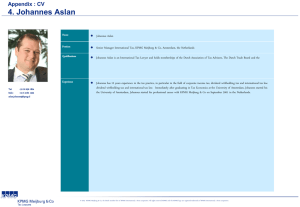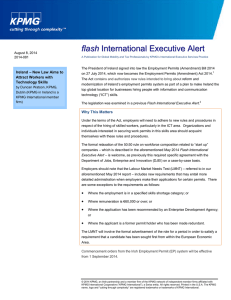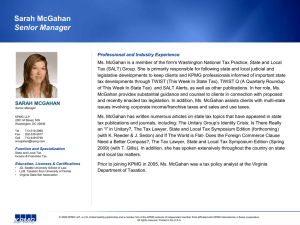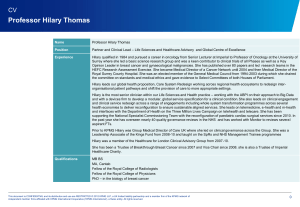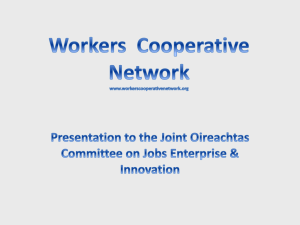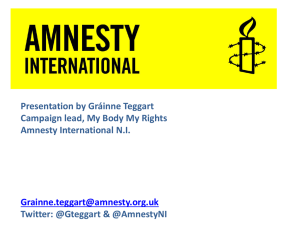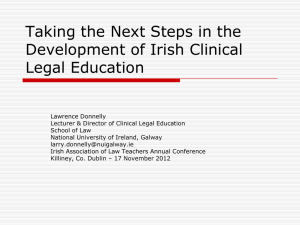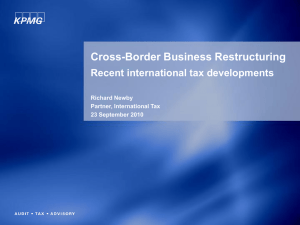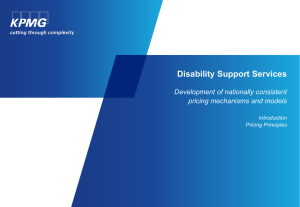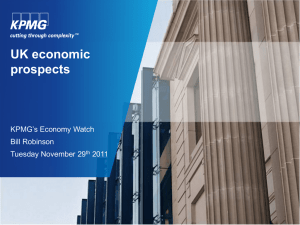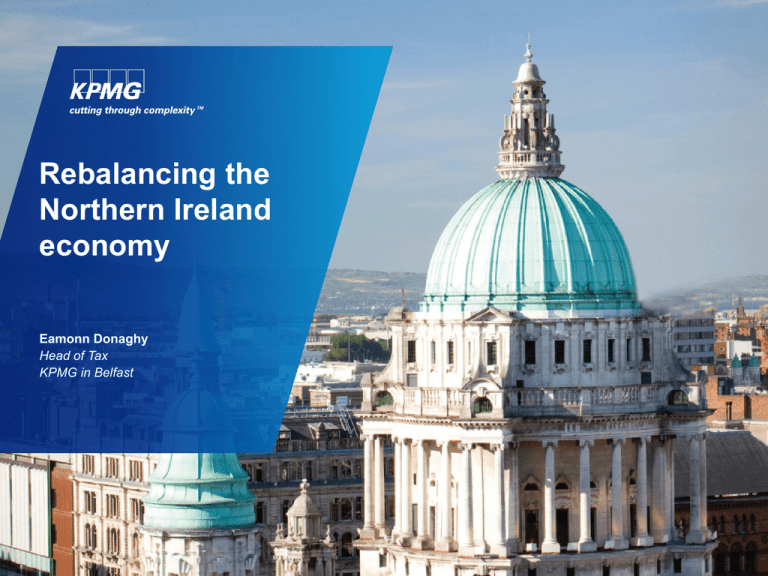
Rebalancing the
Northern Ireland
economy
Eamonn Donaghy
Head of Tax
KPMG in Belfast
Reasons to invest in Northern Ireland
• Educated workforce
• Competitive operating costs
• Advanced telecommunications
infrastructure
• Sectoral/cluster strengths
• Excellent university/business
linkages
• Access to key markets
• Good track record for foreign
direct investment
• English speaking
• Good time zone for East and West
© 2011 KPMG, an Irish partnership and a member firm of the KPMG network of independent member firms affiliated with KPMG International
Cooperative (“KPMG International”), a Swiss entity. All rights reserved. Printed in Ireland.
1
So why has the Northern Ireland
economy consistently failed to
deliver the type of economic
growth that has occurred in the
Republic of Ireland?
Why does the Northern Ireland economy not grow?
• Northern Ireland is too reliant on the public
sector and has too small a private sector
• Current economic policies are struggling to
grow the private sector
• Economic growth is needed and new
economic levers are required
© 2011 KPMG, an Irish partnership and a member firm of the KPMG network of independent member firms affiliated with KPMG International
Cooperative (“KPMG International”), a Swiss entity. All rights reserved. Printed in Ireland.
3
Background to the consultation document
• Reducing corporation tax rates to 12.5% will cause a shift change
• Previous UK administrations have refused to consider a separate Northern
Ireland corporation tax rate
• The current UK Government is actively consulting on this issue
• All the Northern Ireland political parties support the devolution of
corporation tax varying powers
• Backing of the business community in Northern Ireland – The Grow NI
campaign
Not a silver bullet but a key ingredient to making
Northern Ireland a more competitive place to do
business
© 2011 KPMG, an Irish partnership and a member firm of the KPMG network of independent member firms affiliated with KPMG International
Cooperative (“KPMG International”), a Swiss entity. All rights reserved. Printed in Ireland.
4
Current corporation tax rates in Northern Ireland
• Profits up to £300k: 20%
• Profits £300k - £1.5m: 20% - 26%
• Profits over £1.5m: 26% (due to fall to 23% over the next 3 years)
• The UK corporation tax rate is competitive
BUT
Republic of Ireland rate: 12.5% for all
trading companies; no plans to reduce
© 2011 KPMG, an Irish partnership and a member firm of the KPMG network of independent member firms affiliated with KPMG International
Cooperative (“KPMG International”), a Swiss entity. All rights reserved. Printed in Ireland.
5
Benefits of a reduction to 12.5%
• Increased foreign direct investment
• Increased internal investment by existing firms
• Increased economic growth and a stronger private sector
• Potential long-term employment benefits
• Positive indirect impact on tax receipts as a result of growth
• Overall a means to kickstart the Northern Ireland economy which traditionally
has relied more heavily on the public sector than other parts of the United
Kingdom and Republic of Ireland
© 2011 KPMG, an Irish partnership and a member firm of the KPMG network of independent member firms affiliated with KPMG International
Cooperative (“KPMG International”), a Swiss entity. All rights reserved. Printed in Ireland.
6
Financial implications
• Impact on the Northern Ireland block grant
• Artificial profit shifting by GB companies brass-plating
• Additional administrative burdens for both
the Northern Ireland Executive and
businesses
© 2011 KPMG, an Irish partnership and a member firm of the KPMG network of independent member firms affiliated with KPMG International
Cooperative (“KPMG International”), a Swiss entity. All rights reserved. Printed in Ireland.
7
Implementation issues
• Determining the profits which would
benefit from the reduced rate
• Determining Northern Ireland activity from
non Northern Ireland activity
• Profit shifting
• Tax motivated incorporation
• Mechanics of implementing the Northern
Ireland corporation tax rate
© 2011 KPMG, an Irish partnership and a member firm of the KPMG network of independent member firms affiliated with KPMG International
Cooperative (“KPMG International”), a Swiss entity. All rights reserved. Printed in Ireland.
8
Consultation document: options for reducing the rate to 12.5%
An immediate reduction
• The cost to the Northern Ireland Assembly would be £225m - £270m per annum for
the first 5 years of implementation
Deferral of the reduction
• The Northern Ireland Executive could announce an intention to reduce the rate
without doing so immediately, with no immediate cost
Phased reduction
• Would reduce costs in early years and give more time to adjust to the necessary
budgetary changes
• Each 2.5 percentage point reduction in the main rate would cost around £30m –
£50m and around £30m - £40m for the small profits rate
Exclude non-trading profits
• This could reduce the overall costs of the measure by up to £85m per annum
© 2011 KPMG, an Irish partnership and a member firm of the KPMG network of independent member firms affiliated with KPMG International
Cooperative (“KPMG International”), a Swiss entity. All rights reserved. Printed in Ireland.
9
Other options
• R&D tax credits
• Enhanced Annual Investment Allowance (AIA)
• Training credits
• National Insurance holiday
© 2011 KPMG, an Irish partnership and a member firm of the KPMG network of independent member firms affiliated with KPMG International
Cooperative (“KPMG International”), a Swiss entity. All rights reserved. Printed in Ireland.
10
The best solution for Northern Ireland
The clear conclusion must be to:
• Phase in the reduction over a period of 3 - 5 years
• Apply the reduced rate to trading profits only
© 2011 KPMG, an Irish partnership and a member firm of the KPMG network of independent member firms affiliated with KPMG International
Cooperative (“KPMG International”), a Swiss entity. All rights reserved. Printed in Ireland.
11
What happens next?
• Consultation process closes 24 June 2011
• The result of the consultation process will be announced in autumn
2011
• If the Government agrees to devolve corporation tax rate setting
powers to the Executive, it will require a change to the Northern Ireland
Act (6 – 9 months)
• It will then be up to the Executive to decide its rate policy setting and
how to manage the cost within its budget (this could take 2 years
before ‘phasing in’ of the rate will commence).
A once-in-a-lifetime opportunity for the
Northern Ireland economy
eMail:
niconsultation@hmtreasury.gsi.gov.uk
© 2011 KPMG, an Irish partnership and a member firm of the KPMG network of independent member firms affiliated with KPMG International
Cooperative (“KPMG International”), a Swiss entity. All rights reserved. Printed in Ireland.
12

